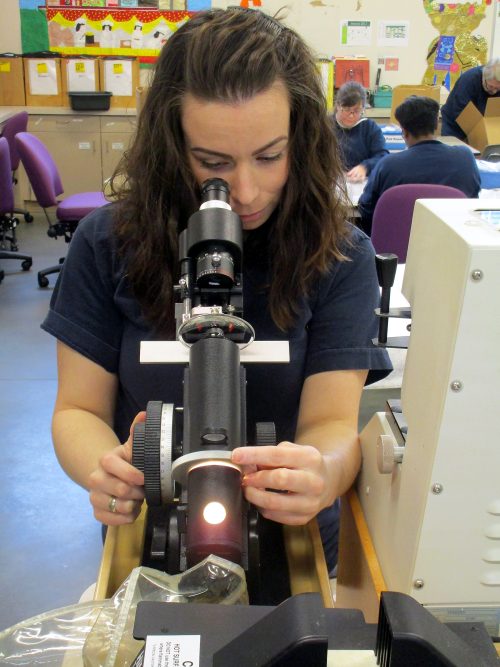This content was published: January 16, 2023. Phone numbers, email addresses, and other information may have changed.
With Future Ready Oregon funding and Pell Grants, PCC aims to bolster education at Coffee Creek
Photos and story by Misty Bouse

In addition to the upcoming writing, math and health classes, students have always been able to learn cosmetology at Coffee Creek.
After more than 20 years hiatus, federal financial aid (Pell Grants) for higher education of people in prisons is back and Portland Community College is at the center of a state-funded program to help transition adults in custody back into society with the skills they need.
A portion of a $2.8 million Future Ready Oregon grant to PCC is funding pilot program that prepares for the July 2023 reinstatement of Pell Grants for academically eligible, incarcerated students. With this state support, the college is providing four faculty members to teach at the Coffee Creek Correctional Facility (CCCF) this winter with more faculty to be added in the spring to ready students.
PCC’s grant from Future Ready Oregon is a small component of a statewide comprehensive $200 million investment package that supports the education and training of Oregonians for family-wage careers with strategic and targeted investments focused on advancing opportunities for historically underserved communities like these women.
The Future Ready Oregon Career Pathways Grant is focused on capacity building, including the pilot program at Coffee Creek, Integrated Education and Training (IET) programs in welding and pre-trades advanced manufacturing, curriculum development in several areas, equipment and contracted services purchases, and staffing for student success and retention.
“We’ll be kicking off the winter quarter with four class offerings: a writing class and a study skills class (“College Readiness”) in the minimum security facility and the same in the medium security facility,” said Lisa Regan-Vienop, manager of Corrections Education Transitions who has been with the college for more than 10 years.
“We have a mix of faculty, those who have worked with corrections before and those who are new to corrections education,” she continued. “We have about 40 students, some of whom are taking both courses, who have signed up.”One such experienced member is English faculty chair and writing instructor Tara McDowell. She taught previously at CCCF and said it is one of the most rewarding experiences she has had in a classroom in decades of teaching.
“Coffee Creek students are focused and dedicated; willing to do the hard work that it takes to truly improve their writing,” McDowell said. “Nearly all of the CCCF students I have worked with are genuinely excited to receive feedback on their work and often want to discuss and reflect on their writing process. I believe, for many college students, the weekly constructive comments and positive feedback they receive on their writing projects chip away at years of negative connotation, which is all too often associated with writing due to prior negative experiences in an English classroom. A little boost in self-esteem can make such a positive impact in all our lives.”
The women in the “College Readiness” course, which is limited to 15 students, will learn study skills and essentials like stress management and time management. It’s a chance to change their fortune around as life on the inside is tough – there is no internet access, laptops, and very limited time on prison phones.
“These are all barriers,” added Regan-Vienop. “For teachers, it’s a low-tech environment for security reasons. It has taken a real collaborative effort to launch these courses, but despite the obstacles, this teaching is rewarding because the Coffee Creek women are creating opportunities through education for not just themselves but their families and communities at home, too.”
The college is aligned with this holistic effort. A team of enrollment, advising and financial aid specialists are poised to meet CCCF student needs. The team also hopes to visit in person regularly to ensure equitable access to vital PCC services. In addition, the program aims to expand offerings for the women by adding math and health courses in spring as well.
“As a college, it’s our mission to serve marginalized and underrepresented people – and this group has definite access issues,” Regan-Vienop said. “Coffee Creek will have close to 100 adults in custody, or AICs, released over the next 18 months to the PCC service district. The college, in partnership with the Department of Corrections, is well positioned to strengthen transitions for AICs re-entering society by creating clear pathways to the college and promoting continued education to increase the economic mobility of AICs.”

